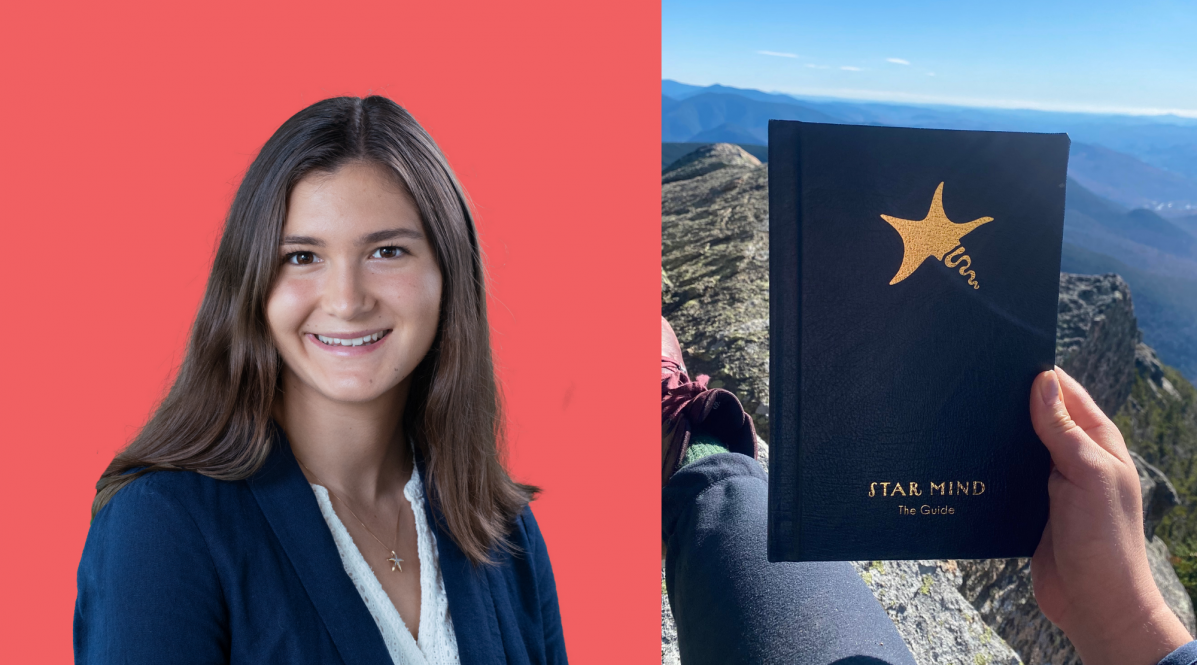There’s a famous poem about a boy and starfish that helped inspire the name of Allie Davenport’s ’24 (BUS) company, StarMind.
An old man, walking down a beach covered with starfish, sees a young boy gently tossing the small creatures, one by one, back into the sea. The man asks the boy why he persists – there are so many starfish, he can’t possibly save them all, so why even bother?
The boy picks up a starfish and says, “well, it matters to this one,” and kindly throws it into the sea.
“That concept of making a difference in other people’s lives is part of what drives my mission,” says Davenport, a sophomore from Litchfield, who started her company through her involvement in the initial cohort of the F3 Experience, an immersive program for first-year women and students from historically minoritized populations offered through UConn’s Peter J. Werth Institute for Entrepreneurship and Innovation.
“Starfish have this unique ability to regenerate limbs when they’re damaged,” she says. “The idea of salvation and growth through hard times is a large part of the ‘small wins’ concept – you can grow through what you go through. To me, success means helping others shift their mindsets to focus on daily, often overlooked, accomplishments and progress.”
“Small wins” feature in a big way in Davenport’s first venture and in StarMind’s initial product, The Guide – an interactive journal that combines daily logs, “morning mindfulness,” activities, and areas for reflection with key psychology concepts and curated online content accessible through QR codes imbedded into an American-made navy leather-bound tome.
“Each QR code is centered around a certain psychological concept,” Davenport explains. “There’s time management, sleep, motivation, growth mindset – ideas that everyone, I think, in this time of pandemics and uncertainty has a personal tie to, in one degree or another.”
“Allie owned the entrepreneurial process over the last year,” says Werth Institute Director David Noble. “She takes coaching from a diverse set of mentors, collaborators, or customers, and prioritizes the next steps. I’m very excited to continue working with StarMind and Allie as she travels on this entrepreneurial journey, progressively growing and looking at new opportunities.”
Davenport – who is currently a student in the School of Business, but is considering a dual major in Cognitive Science – has dedicated her brand to mental health and self-development, because those key psychological concepts so integral to The Guide have played a vital role in her own life.
“When I was a sophomore in high school, I was a multi-sport varsity athlete, physically fit and playing all the time, and then during one soccer game, I started feeling my throat tightening,” she says. “I had never in my life experienced a breathing attack before. It was terrifying.”
Initially, Davenport was diagnosed with exercise-induced asthma and given an inhaler.
“It did nothing,” she says. “I was like, ‘I don’t think this is asthma,’ and so eventually I went to Connecticut Children’s Medical Center and was referred to a speech pathologist.”
That concept of making a difference in other people’s lives is part of what drives my mission — Allie Davenport '24, StarMind founder
During a test called a laryngoscopy, where a camera was passed down her nose and into her throat, Davenport was told to think about what it felt like when she experienced a breathing attack. Just the idea and the panic, she says, was enough to trigger the condition, finally diagnosed as Paradoxical Vocal Fold Motion (PVFM). PVFM is a breathing disorder where the vocal cords function abnormally, resulting in stridor – coarse, noisy breathing – and restricted airflow during respiration.
“I read nearly every research paper under the sun – it’s not a common disorder,” Davenport says. “I was trying to understand where it was coming from, and eventually I learned that one of the common underlying causes is anxiety. My mind was powerful enough to trigger my vocal cords, a physical part of my body, to malfunction and restrict airflow. This epiphany sparked my journey of self-development and the quest to understand myself.”
She underwent months of speech therapy to help retrain her body how to breathe. But she also had to retrain her mind.
“It wasn’t like I could just take an inhaler,” she explains. “There was no magic pill or surgery to cure me. I practiced certain breathing techniques to relax my throat, but also had to train my mind not to panic if I felt an oncoming attack during games. PVFM forced me to identify my triggers and find ways to manage that stress.”
The experience instilled in Davenport a deep, personal passion for mental wellness, but coming to UConn gave her the malleable mindset so that she could use her insights to help others. Finding the Werth Institute and the support of the F3 Experience unveiled her own entrepreneurial interests, even though she hadn’t previously thought of herself as an entrepreneur.
“Being an entrepreneur is about solving problems and connecting with people, taking calculated risks and really seeing something that doesn’t yet exist,” she says. “What is the root problem? What’s not being addressed? How can I solve that, or at least be a part of the solution? Psychology is such a touchy subject that really means something different for everyone. I’m just trying to help make an impact, and that’s what an entrepreneur does.”
Davenport sees The Guide as a tool – not a replacement for therapy or medication, but something to help develop a different mindset and discover more about yourself. The holistic nature of The Guide means it’s a tool anyone could benefit from using, she says.
Her experiences through the Werth Institute have given her community at UConn, and a new sense of self-confidence, even though it has not always been easy to step outside her comfort zone.
“The Werth Institute provided me with a support system that I leaned on and gained confidence through when launching StarMind,” she says. “If it wasn’t for that experience, I’m not sure if entrepreneurship would even be in my vocabulary. I’m now looking at my future through a lens of possibility, not of fear.”
To support Allie and learn more about The Guide, visit mystarmind.com and follow StarMind on Instagram.
To learn more about the Werth Institute and undergraduate entrepreneurship opportunities at UConn, visit entrepreneurship.uconn.edu.



